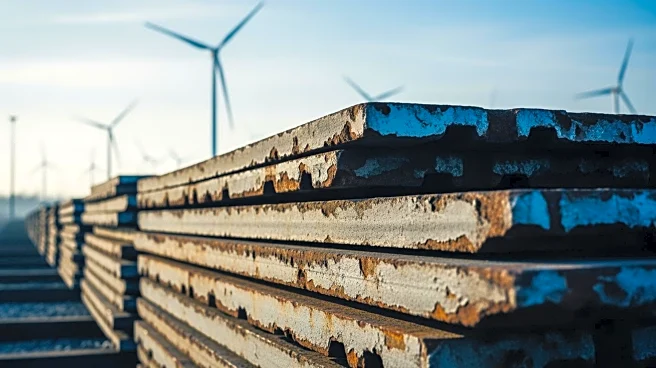What's Happening?
A recent report by the NGO Shipbreaking Platform, in collaboration with Sandbag - Smarter Climate Policy and the University of Tuscia, emphasizes the role of scrap steel from decommissioned ships in aiding
the decarbonization of the European steel industry. The report suggests that recycling ship steel could significantly reduce CO2 emissions by up to 80% compared to using virgin materials, while also using 40% less water and energy. The European Union's climate targets necessitate a shift from carbon-intensive blast furnace steelmaking to low-carbon electric arc furnace technology, which can incorporate high amounts of scrap steel. The report advocates for policies that enhance traceability, stricter enforcement, and financial incentives to make ship scrap a cornerstone of a circular, low-carbon steel economy.
Why It's Important?
The integration of ship scrap steel into the European steel industry represents a strategic opportunity to meet climate goals while also addressing economic and environmental challenges. By utilizing high-quality ship steel, Europe can reduce its reliance on carbon-intensive processes and improve sustainability. This shift not only supports the EU's climate targets but also offers economic benefits by creating a more circular economy. The report highlights the need for clear data on steel composition and certification to maximize the value of ship scrap, which could satisfy a significant portion of the EU's annual scrap steel demand. This initiative could lead to a more sustainable and competitive European steel industry.
What's Next?
The report calls for upcoming EU policies, such as the Circular Economy Act and the Industrial Accelerators Act, to explicitly support sustainable ship recycling. These policies should align with EU circularity principles to ensure the effective integration of ship scrap into the steel industry. The anticipated surge in EU/EFTA-owned ship demolitions over the next decade presents an opportunity to increase the supply of high-quality scrap steel. The implementation of digital material traceability tools and research into ship life-extension could further enhance the economic and environmental benefits of this initiative.
Beyond the Headlines
The report underscores the importance of innovation in recycling technologies and the collaboration between maritime, steel, and construction industries to close material loops. By enhancing traceability and documentation, the seamless integration of ship scrap into various industries, including construction, can be achieved. This approach not only optimizes recovery rates but also boosts economic and environmental benefits. The initiative highlights the potential for Europe to lead in sustainable industrial practices and set a precedent for other regions to follow.










